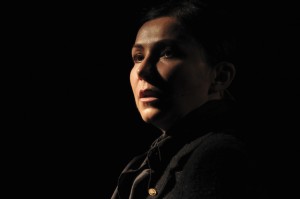Cut | Belvoir
- April 14th, 2011
- Posted in Reviews & Responses
- Write comment

In the half nest of Belvoir’s Downstairs Theatre, there is nothing to give us any sign of what is about to happen. For those that skim programmes in foyers – or flick over postcards – or read reviews or previews, perhaps you already know. I didn’t. I like to sail blind -I always read reviews after the event -because really, they’re not to be trusted – only because words in print (or online) can only barely replicate the moment – mainly perhaps because theatre is not such a linear experience and our language, it seems, is trapped on lines. Trapped in sentences. But the language of theatre, or memory, or feeling – swirls like thick red wine in a glass, leaving the ghost shadow of a sensation. I sail in. Blind.
The rumblings of sound courtesy of sound designer Ekrem Mulayim favouring the sensation of sound and the rolling underscoring – not in as a melodic or literal overture but as a slow seeping of sound. It’s dark. Danny Pettingill (Lighting) has found a way of shrinking space, drawing the space closer, darker… we are inside something. Something unfamiliar.
The woman. When we see her, she’s recounting her day, the steps, the smells, the people all the minute that leads to her life… An air hostess prepares for her flight. She makes her way into the world. This is familiar. We hear her tasks and internal monologue – monotonous almost – but like a conspiratorial secret, without any overstatement. She is watching, being watched, by a man.
What happens is incredible – and I’m not the sort of person to destroy the potential deight/horror in you discovering all this on your own, for the first time, in the dark, in that nest. All I can say is what you’ve heard about Anita Hegh’s performance is true – she is stunning – and one of the truly great actors of this era. And Sarah John is an exquisite conductor of sound, narrative and action.
Sustained over 50 minutes, Sarah John’s production is dreamlike yet lucid. Penned by Duncan Graham, this is a remarkable piece of writing. We can hear the loops and the references resonate. The story folds back on itself. It feels like an epic poem or a radio confessional from a disembodied voice. There is something about the memory, or darkness, or guilt which pervades this piece – perhaps we question our actions – or our instincts? Perhaps the question of the play is what is normal, and under what circumstances?
It is remarkably brave. And I use that word, not in a perjorative sense. This is the edge of theatre. I believe this could be the edge primarily because the production asks us to surrender utterly – and if we fight it – do we do ourselves more harm than good? What is our choice as audience? What situation have we put ourselves in? It takes a certain type of audience to go there. This isn’t theatre for the musical theatre set. In fact, this is theatre which is truly a piece of crafted, precise, concise art – the blend of sound, poetry and performance telling us that which is obscene (in the ancient Greek sense – the off stage, not in the sense of being morally repugnant) – it is brutal and deeply effecting. Incredible.
I catch my breath thinking about this show. And there has been, and probably will be, no other show this year which will more intimate, more evocative, challenging and profoundly artful. If you are brave, I’m sure you’ll see it.
it is truly a very wonderful piece of theatre. I think it masters the use of minimal set and progressive manipulation of sound and light structure perfectly.